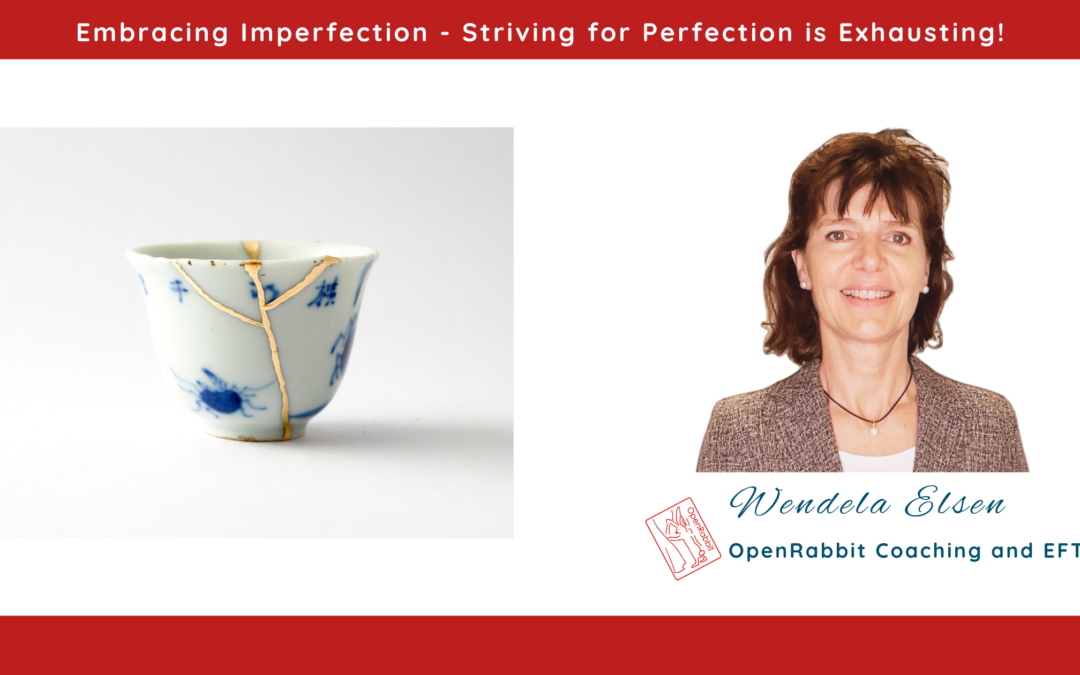In a world that constantly pushes us to be the best, do the most, and keep it all together, it’s easy to fall into the trap of thinking we need to be perfect. For many professional women, this pressure feels like a constant presence. Whether it’s meeting tight deadlines, staying on top of responsibilities at home, or being there for everyone who depends on you, it’s hard to keep up with the endless demands—and even harder to feel like you’re doing a good enough job.
The belief that we have to be perfect, that we mustn’t let anyone down, or show signs of weakness, can feel like a heavy weight. It’s exhausting, draining, and never-ending. And yet, so many of us keep striving, pushing ourselves beyond our limits, thinking that perfection is the answer.
But what if I told you that perfection isn’t what life is about? That there’s beauty in being imperfect, in accepting life as it is, and in letting go of the need to be flawless?
In Japanese culture, there’s a wonderful concept that speaks directly to this—wabi-sabi. It’s the idea that there is beauty in imperfection, in the transient and incomplete. It’s a philosophy that encourages us to embrace life’s flaws rather than fight against them. And it’s something I believe many of us, especially those juggling professional and personal responsibilities, can learn from.
The Beauty of Imperfection: What Wabi-Sabi Can Teach Us
At its core, wabi-sabi is about finding beauty in the imperfect, the weathered, and the broken. It teaches that nothing lasts forever, nothing is ever truly finished, and nothing is perfect—and that’s okay. More than okay, actually—it’s beautiful.
One of the most well-known expressions of wabi-sabi is kintsugi, the art of repairing broken pottery with gold. When a bowl or vase is cracked, instead of throwing it away or hiding the damage, the cracks are filled with gold lacquer, making the piece even more beautiful than before. The idea is that the object’s history, its imperfections, make it unique and precious. The breaks and repairs are part of its story, and they deserve to be celebrated.
Now, imagine if we applied this same thinking to ourselves. What if we stopped trying to hide the cracks, the imperfections, and instead embraced them as part of who we are? What if we allowed ourselves to be ‘good enough,’ rather than constantly striving for a standard of perfection that doesn’t even exist?
Perfection Isn’t the Goal—Fulfilment Is
For so many professional women, there’s a strong sense of needing to be perfect. But the truth is, this constant striving for perfection is what’s draining you. It’s not fulfilling to feel like you are always falling short, no matter how much you do. It’s not joyful to feel like you’re holding everything together with sheer willpower, while on the inside, you’re just barely keeping afloat.
This need for perfection is often what keeps us from reaching out for help. We think that asking for support is a sign of weakness, or that if we admit we’re struggling, we’ll somehow lose credibility. But the reality is, no one can do it all. No one is perfect and pretending that we can be is not only unrealistic but also harmful to our wellbeing.
How to Let Go of Perfection and Find Joy Again
So, how do we start to embrace imperfection and let go of this constant need to be ‘perfect’? Here are a few thoughts:
- Accept that Perfection Is a Myth
The first step is recognising that perfection doesn’t exist. It’s an ideal that can never be reached because, as soon as we think we’ve got everything just right, something changes. Life isn’t static. There will always be unexpected challenges, things that don’t go as planned, and moments when we feel like we’re not enough. Instead of trying to fight this, we can choose to accept it. - Celebrate the Cracks
Like the kintsugi pottery, we all have our own cracks—whether they’re past mistakes, personal struggles, or areas where we feel less than capable. Rather than trying to cover them up, what if we saw them as part of our unique story? Our challenges and imperfections make us who we are. They give us strength and resilience. When we embrace these parts of ourselves, we can start to see the beauty in being imperfect. - Set Boundaries and Prioritise
One of the reasons we feel the need to be perfect is because we’re trying to do too much. We want to be the best at work, the best parent, the best partner, the best friend—and it’s just not possible. By setting boundaries and deciding what truly matters, we can begin to focus on the things that bring us joy and fulfilment, rather than trying to be everything to everyone. - Ask for Help
There’s a misconception that asking for help is a sign of weakness. But in reality, it’s a sign of strength. It takes courage to admit that we can’t do everything on our own and to reach out for the support we need. Whether it’s through coaching, therapy, or simply talking to a trusted friend, asking for help can lighten the load and give us the space to breathe again. - Practice Self-Compassion
We’re often our own worst critics. We hold ourselves to impossibly high standards and beat ourselves up when we don’t meet them. Practising self-compassion means treating ourselves with the same kindness and understanding that we would offer a friend. It’s about recognising that we’re doing our best, and that’s enough. By letting go of the harsh inner critic, we can begin to find peace and contentment in the present moment.
Finding Fulfilment in Imperfection
Ultimately, it’s not about being perfect—it’s about being fulfilled. It’s about finding joy in the small moments, the imperfect ones, and recognising that life isn’t about ticking off a to-do list or meeting an unattainable standard. It’s about embracing the beauty of imperfection, and allowing yourself the space to breathe, to make mistakes, and to simply be.
So, the next time you feel like you’re not doing enough, or that you’re falling short, remember wabi-sabi. Remember that there’s beauty in the cracks, in the parts of life that are messy and unpolished. And remember that by letting go of perfection, you’re giving yourself the freedom to live more fully and joyfully.
If you’re feeling like the weight of perfectionism is draining you, know that you don’t have to carry it all alone. There is strength in reaching out for help, and it can be the first step towards finding true fulfilment in your work, your family life, and most importantly, in yourself.
Wendela Elsen is an ICF certified coach and EFT practitioner. She helps professional women navigate draining life challenges to restore joy and fulfilment in work, family and social life. You can read more about her work on her website https://openrabbit.com
©Wendela Elsen, 2024, All rights reserved.

